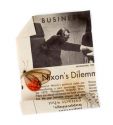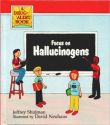[A]n exhaustive overview detailing the botany, geography, history, mythology, archeology, chemistry, and pharmacology of this widely used entheogen. ...The book is considerably enhanced by 59 high quality black & white plates, 41 of which contain photographs. Many of the remaining plates are attractive pen-and-ink drawings by Donna Torres. ...All in all, this is as solid a reference book as I can possibly imagine, and one which should grace the shelves of every entheophile’s library. [ read more ]
Free of any political or medical pretense, Siegel deftly covers the past, present and future of drugs. Moreover, he rarely reveals his roots in academia by drowning the reader with overwrought or technical language. His anecdotes are insightful, if occasionally suspicious, but help make Intoxication a snappy and informative read. [ read more ]
Klea grew up in the swirling penumbra of Terence’s peculiar shadow, and, like many children of famous and colorful folk, had to consciously define her own creative voice apart from her father’s world. In its first, gallery iteration, The Butterfly Hunter did not mention her father’s name, because she wanted the work to stand on its own merit. It is a mark of her courage that her book takes on Terence’s legacy, and a mark of her success that she does it with such candor and care. [ read more ]
an uneven book that makes a heroic effort to describe the potent psychedelic entheogen from many points of view. It describes the use of this plant by the Bwiti tradition of West Central Africa from its earliest recorded history in the nineteenth century through the present day. [ read more ]
...how did America’s relationship with psychoactive substances become so troubled? In The Cult of Pharmacology Richard DeGrandpre argues that dominant voices in US culture and science distort our understanding of psychoactive substances through a form of essentialism he calls “pharmacologicalism”, in which drug effects are explained entirely by the physical and chemical properties of the drugs themselves. [ read more ]
This is a remarkable book. Epidemiologist Leigh A. Henderson, as a consultant to the National Institute on Drug Abuse (NIDA) and NIDA Project Officer William J. Glass started with the government’s own survey data, worked with the authors of a new, individual and community-level ethnographic study, analyzed and interpreted these half-dozen data sets very conservatively, and ended up concluding that LSD is relatively safe and the laws far too severe. Some would say that these conclusions are still too conservative. Perhaps that’s the point: Even a conservative reading of government data will not support today’s absolutist attitudes and draconian laws. [ read more ]
The Cacahuatl Eater leaves no stone unturned in telling the story of mighty chocolate. Ott sketches the cultivation of the plant Theobroma cacao from seed to sprout to fruit, then follows the harvested bean all the way through the production process to the dessert plate. He considers the cultural history of cacao, focusing on its use by the Aztecs, who not only drank a frothy, bitter beverage brewed from its beans, but used them as currency as well. [ read more ]
A good accompaniment to Ruck et al’s The Apples of Apollo. Recommended for university, major public libraries, and psychedelia collectors. Too much ancient-history context for my taste, but it may suit the taste of classicists who are willing to accept Hillman’s claim that in ancient Greece and Rome the non-medical uses of psychoactive plants was widespread and widely accepted as a natural part of life. [ read more ]
Focus on Hallucinogens is much better than it could be. While it does not acknowledge that anyone in the modern world could take psychedelics and have a pleasant or useful experience, it is well-researched and it contains some good information. Shulman offers a decent middle school primer to hallucinogens and gives a serviceable overview of the history of their use in traditional cultures. [ read more ]
Real Drugs in a Virtual World addresses issues such as how harm reduction websites, including Erowid, affect the use of club drugs, how drug information websites are utilized by drug-using subcultures, how individuals assess the accuracy of online drug information, and the impact of the internet on face-to-face conversations about drug use. [...] This book and a handful of academic papers constitute the breadth of research to date examining this critical issue. We appreciate the authors dipping their toes into this topic and hope that others follow in their footsteps. [ read more ]











